Economists have long argued that a price on carbon, such as through a carbon tax, is a critical component of efforts to stabilize greenhouse gases (GHGs) in the atmosphere. One concern about the policy, however, is its negative effect on low income households, both in absolute terms and relative to higher income households. A carbon tax would be regressive because lower income households tend to spend a higher percentage of their income on energy and other goods whose relative prices will increase under a carbon tax. A number of analysts have noted that policymakers could target some of the revenue to benefit low income households so that on average they bear no net burden from the tax.
Recent proposals in the United States, such as Stone (2015), call for channeling carbon tax revenues to low income households through a portfolio of existing social safety net programs, including refundable tax credits like the Earned Income Tax Credit (EITC). Households that file a federal tax return could receive tax credits in an amount on par with an estimate of the burden they bear from the carbon tax.
In their new paper, “A U.S. carbon tax and the Earned Income Tax Credit: A analysis of potential linkages,” (PDF) Adele Morris, Brookings Senior Fellow, and Aparna Mathur, Resident Scholar with the American Enterprise Institute, examines, individually and jointly, an excise tax on carbon and an expansion of EITC benefits to childless workers. The paper estimates how an illustrative tax of $32 per ton of CO2 from fossil fuel combustion would burden households differentially across the income distribution, how it could affect worker benefits from the existing EITC program by lowering wages, the share of the revenue that would be necessary to fund an EITC expansion to childless workers, and the further resources policymakers would need to target to low income households to hold them unburdened on average from a carbon tax.
The research finds that although in principle a carbon tax that lowers wages could affect EITC benefits and thus impact low-to-moderate income households, the likely magnitude of the effects is very small. In addition, Morris and Mathur find that far more important to the distribution of burden is the extent to which the carbon tax passes through to raise retail prices, a decidedly regressive outcome, versus lowering wages, which is distributionally much more neutral. Using emissions and other data from 2013 and 2014, they find that the revenue from the carbon tax could be enough to expand the EITC to childless workers and hold other low income households harmless, combining a regressive tax with progressive benefits. Such a policy package could create net benefits for on average for the lowest income deciles while improving incentives to work and providing environmental benefits, Morris and Mathur argue. Read the full report here.











